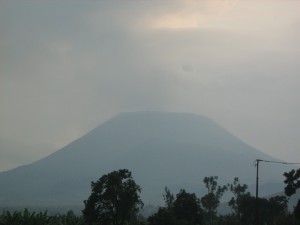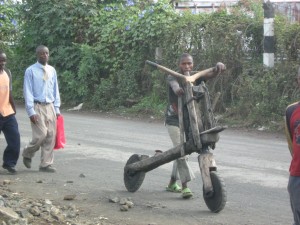The Kivu Reintegration Centre, Goma Nord-Kivu January 20th
Once you’ve passed the dreaded accreditation process at the hands of intelligence and got yourself settled, there is actually much to appreciate in Goma. The attractively laid out colonial city, with its wide avenues and villas with big gardens of jacaranda and flame trees, set beside Lake Kivu, which stretches to the horizon like a Great Lake, can easily let you forget the other awfulness of this province. The high elevation climate is pleasant—with warm days and cool nights—and there are nice bars and restaurants and, for the Congolese, who definitely appreciate a good time, this is one release available. The human spirit is an indomitable thing; people get on with their lives, and there is far more joy than suffering apparent here.
My counterparts, the Kivu Reintegration Centre (http://www.kivurc.com), are one such source of light, a gutsy organisation doing much with little. Having strong roots in the community and a budget of just $300/month—all of it from staff and local donations—the Centre, or KRC, as I now call it, has responded to a very real need in Goma and North Kivu: providing basic skills training and positive socialisation to what are an unruly part of this community: young men living on the street who have experience of war. Street children, orphans, war wounded and demobilised soldiers—often all one and the same—are its main participants. In wonderfully apt local terms, these are what Gomaites call: “people in particularly difficult situations”. More remarkably, KRC is doing this while most reintegration programmes run by the UN in the province are stalled, awaiting funding, organisation and approval, and may not get going for six months.
 Ferdinand and Dominique, the coordinator and co-coordinator, show me around their office, which is two small rented rooms in an outbuilding behind a warehouse in one of the muddy overcrowded Quartiers of Goma. Despite its basic facilities the Centre has some remarkable strengths, among the intangible qualities that determine how well and how effectively a development institution, any institution, functions.
Ferdinand and Dominique, the coordinator and co-coordinator, show me around their office, which is two small rented rooms in an outbuilding behind a warehouse in one of the muddy overcrowded Quartiers of Goma. Despite its basic facilities the Centre has some remarkable strengths, among the intangible qualities that determine how well and how effectively a development institution, any institution, functions.
KRC is local. It is run by members drawn from a community whose needs it serves. Its staff are volunteers contributing their time without salaries. There is no entitlement or false claims about success and moral relevance—common among international NGOs—and there is no capacity for graft or anything to be gained from being here apart from knowledge of participating in the goals of the centre. Its students, to be admitted, must be motivated, passing a basic literary test and agreeing to the centre’s rules. Classes start at 630AM and run for two hours, every day for three months, taking place in a local Church hall which has donated its space.
Agency reports about demobilisation in the Kivus note that the extent to which an organisation, an institution or a programme, is trusted and valued has a direct relationship with how close it is to the community it serves. The more removed, physically—and otherwise—the less present it is on a day to day basis to respond to needs, the less relevant its services, and the less trusted and valued it is as a partner, whether that is the UN peace keeping operation—admired as helpful and non corrupt—but otherwise not close or effective, or foreign NGOs, whose interests and perceptions may or may not fit with those of a community. By the same principle even Congo’s corrupt and despised national police tend to be more trusted than, for example, the army, for the reason that they do actually live in the community. Local is accountable.
KRC’s students are mostly youths sleeping and living on the street or “in difficult situations”. To be admitted they submit to a vetting process, something which is carried out by the centre’s outreach workers, or “sensitisation” officers. The claimed story is verified, the family is traced, and where possible the centre will mediate to bring the youth back to the more stable environment of a family or even their community if they are from outside Goma. If suitable, they are admitted to the centre’s courses—English and French language training and basic computer skills. The demand for this training exceeds what the centre can currently provide.
Beyond the training and family reunification KRC is a kind of drop-in centre or community liaison office for street youth that promotes positive socialisation. They have mediated between street kids and the UN peace keeping operation, MONUSCO, helping stop the stoning of UN vehicles in Goma. The chosen solution was to have the peace keepers, a local Indian Army unit, come in and sponsor a meal for the kids. There is also a football team for the street boys that plays in a local league. The uniforms are rented; they’d like to be able to buy ones of their own. These are how basic the needs and means of the centre are. The “computer lab” is a small room with an ancient looking desktop and two laptops. There is no printer, no scanner, and no internet. Students learn Windows, Word and Excel.
It is my job to help them write a project proposal, identify potential donors and access funding to expand. The UN which is helping co-manage demobilisaton and reintegration programmes together with the government and international NGOs, is one obvious place to start. My next meeting is with the director of the UN’s demobilisation and reintegration operations.
***
